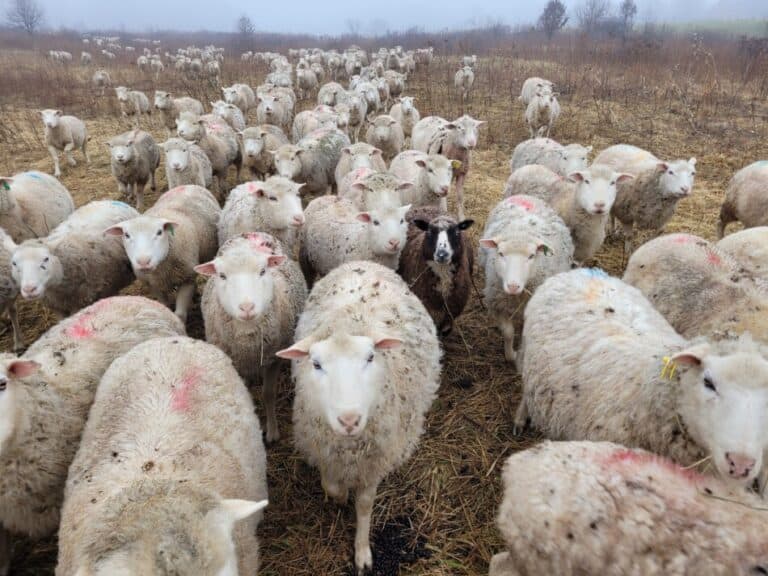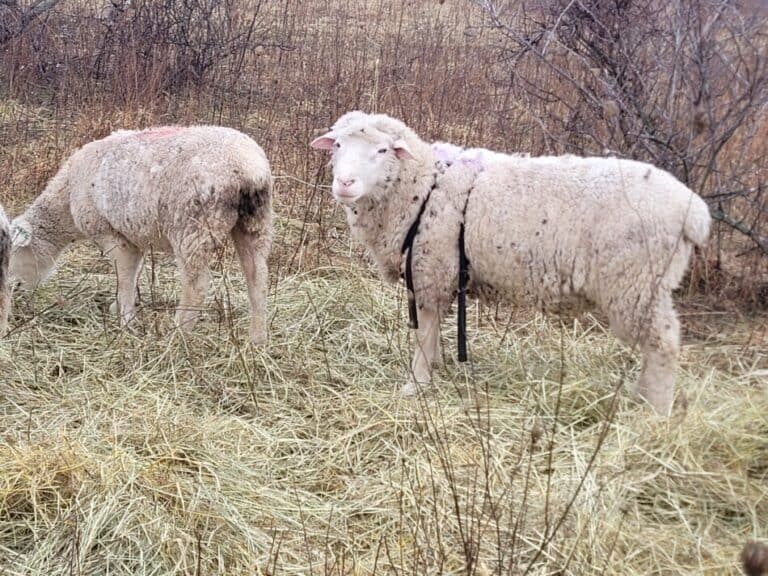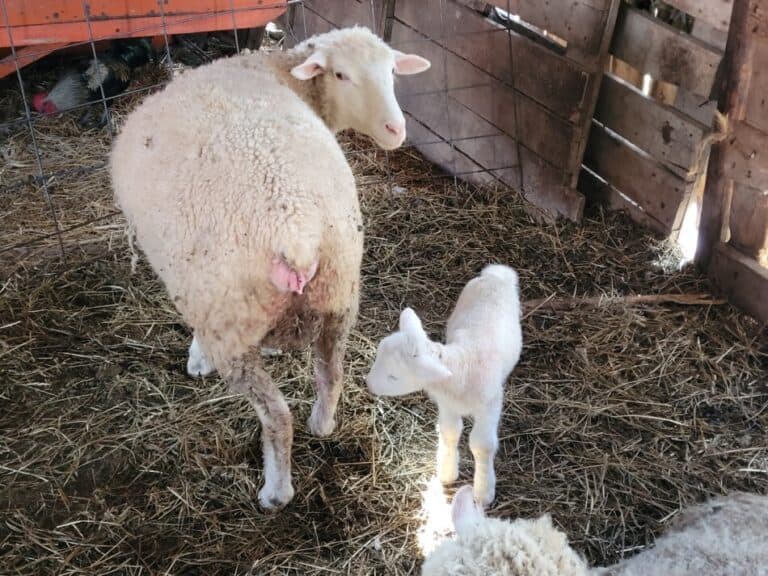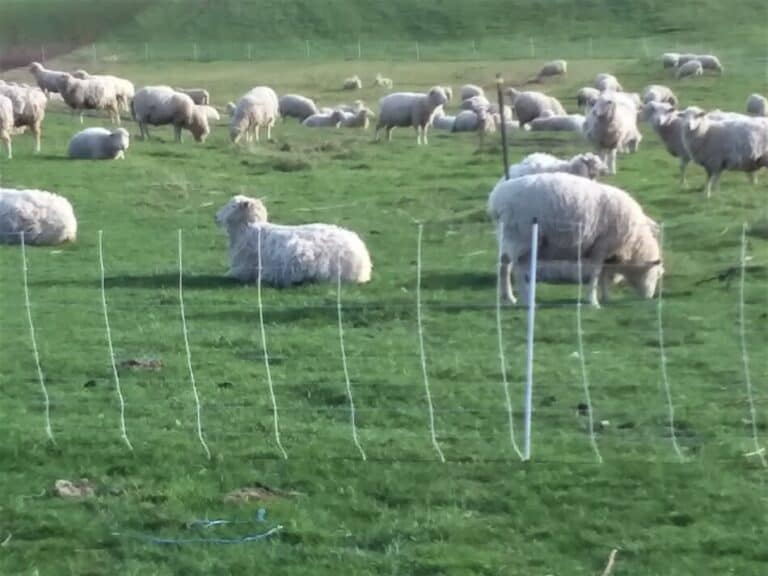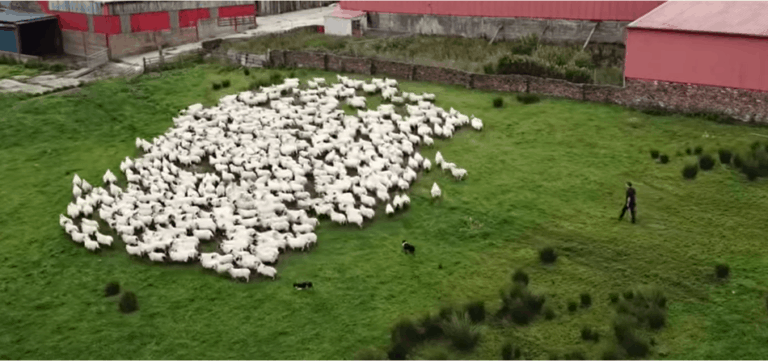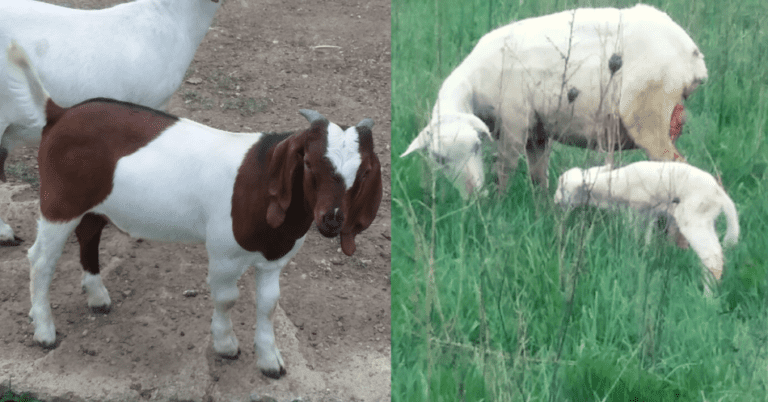5 Reasons To Not Keep Bottle Lambs For Breeding Stock
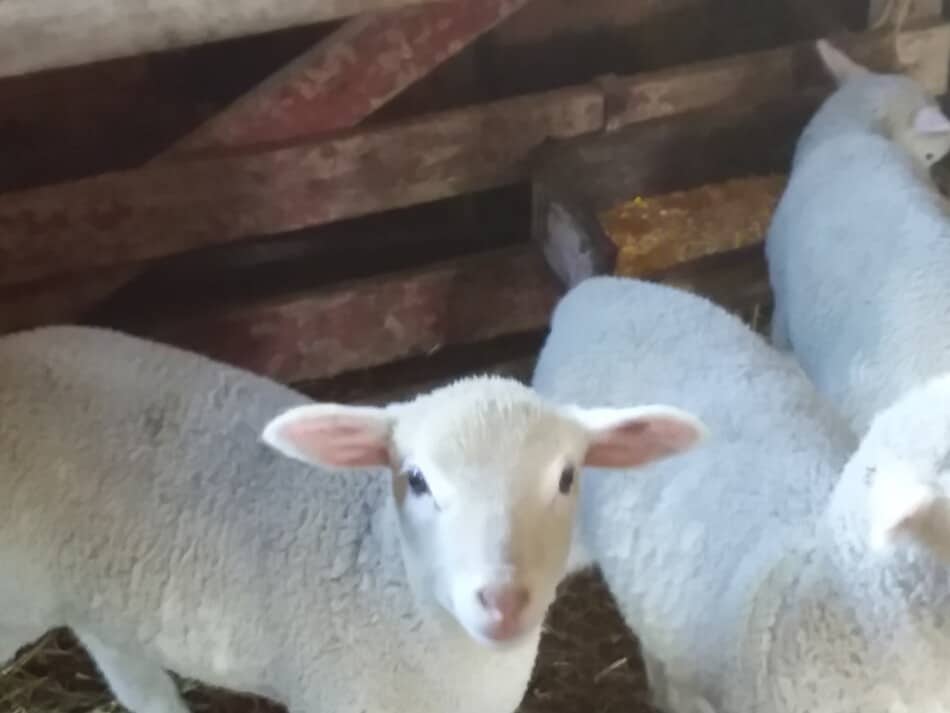
Bottle lambs are going to, of course, be more work for you than lambs that are raised by a ewe. Even if you are willing to put in the work, will it be worth your effort, as far as keeping those bottle lambs as breeding stock?
Bottle lambs should not be kept as breeding stock. A former bottle lamb will be passing on to the next generation the genetic problems that made it a bottle lamb in the first place. By keeping and breeding a bottle lamb, you are perpetuating problems rather than working to improve the genetics of your flock by eliminating problems.
If you are interested, How Much Hay Do Sheep Need? will help you figure up your hay costs for the winter.
Mothering ability is passed on from the ewe
Most of the things you are dealing with when you have a bottle lamb are genetic. True, you can have the occasional crazy environmental happening that interferes with your flock, but for the most part, it’s genetic.
The reason you don’t keep a bottle lamb as one of your breeding ewes is that you don’t want to keep dealing with whatever made this lamb a bottle lamb in the first place.
Did the lamb’s mom not have milk, did she take care of one baby and leave the other, or worse than all of this did the ewe die?
Whatever the reason you have a bottle baby is not a trait you want to keep dealing with in your flock.
Easy Sheep Breeds For Beginners gives you our top picks for beginner friendly sheep to get you started!
The ram could be the problem, half of the genetics are from him!
I’m sure anyone with even a passing knowledge of genetics will be saying “wait a minute, what about the ram” as far as genetics go. He’s contributed half of the lamb’s genes, just like the ewe.
True, the ram is half of the genetics of the lamb, but the ram is also half of the genetics of the other lambs that are not bottle babies! This makes the problem more likely to be the ewe.
If you are seeing a wide spread problem, with a large percentage of the lambs being bottle lambs, now you should start looking to the ram, as well. If it’s just one or two lambs, concentrate on the ewe.
Sell all bottle babies, even if you are growing your flock
Believe me, I understand the need for increasing flock size and how hard it is to sell off ewe lambs that were bottle fed when you are wanting to increase your flock for next year.
Sell those bottle babies. For the future success of your flock, you have to do it!
Don’t keep lambs from situations that you do not want to deal with. Since the bottle lamb has his mom’s genetics, he also has some of his mom’s weaknesses. Sell those weaknesses, don’t’ keep them.
Consider selling the ewe, as well. If she is the only one who needed you to take care of a baby, she’s the problem. Cull her so you won’t have to deal with this problem again next year.
If there are multiple bottle babies from multiple moms, the problem is something else, probably management or the ram.
Don’t forget about the mothering ability passed on from the ram
While the ram won’t do any mothering of the lambs, of course, you want to have good mothering ability being passed on from both the male and female sides of your flock.
If you keep and use a bottle baby ram, you are now putting poor mothering skills out amongst the whole flock, yikes! That is a huge step backwards for your flock’s genetics!
Above all things, do not keep a bottle baby ram! No matter how cute he is! Cuteness fades, his poor genetics will continue on and come back to bite you for years to come.
Be strong in your commitment to your flock’s genetics and sell all bottle babies, especially the rams!
An easy way to avoid the “oops” of unwanted or unplanned breedings, castrate these bottle baby rams. Keeping him around and intact is asking for problems.
Accidental breedings are very common and intact ram lambs are more capable of breeding ewes than you would guess. Get him gone or, at the very least, castrated!
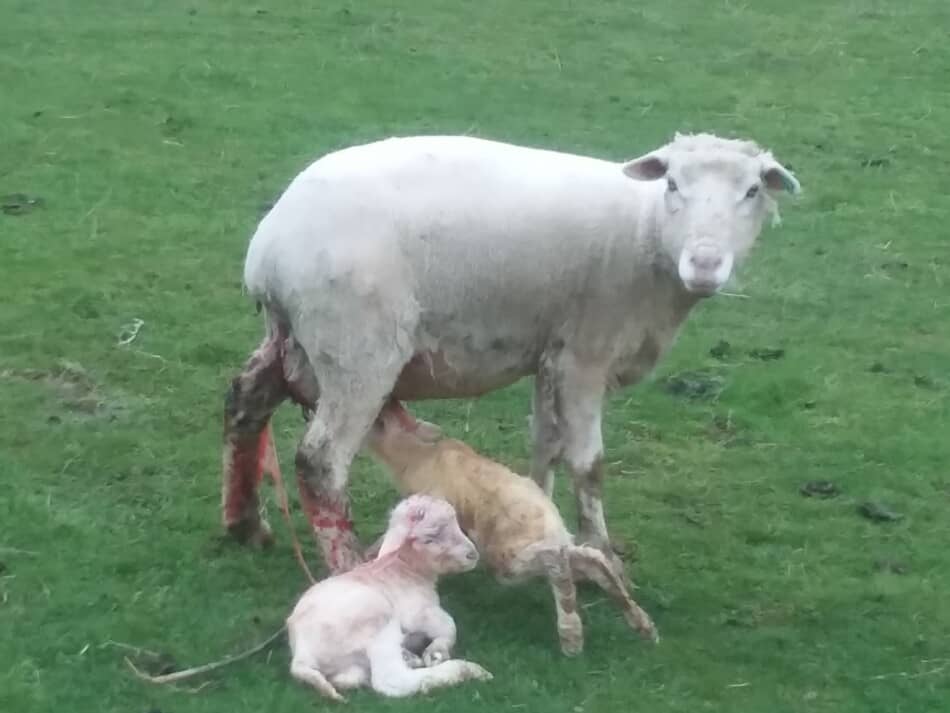
Keep traits you want in your sheep (not bottle feeding)
Ideally, you are keeping lambs from moms that are working well for you and your management system. The ewe or lamb that needs special care is not performing well for you.
Give the care, of course, but note that it was needed and sell the sheep. Don’t keep needy sheep around to make your job harder next year!
Lambs learn to graze and behave from hanging out with their mom. The ewe teaches the lambs what is okay to eat and how to spend time grazing.
While your bottle lamb will learn to eat grass, when you finally decide to turn it out, the lamb’s digestive system will have to work really hard to get nutrients from the grass.
Since your bottle lamb has been getting milk replacer, not real milk from mom, and snacks of grass throughout the day the bottle lamb’s digestive system is not ready to all grass.
The bottle lamb has not gradually worked up to grass eating, as would be the case of the lambs raised with their moms, meaning they will be slower to “get it” when put with the rest of the flock (if you choose to put them out at all.)
We tend to keep our former bottle lambs (that are being grown out for market lambs) in the barn since they are a bunch that will need monitoring and that’s easiest to do when we know exactly where they are at!
Bottle lambs will behave differently
One of the other odd things about a bottle lamb is that it will behave differently than the rest of the non bottle lamb sheep.
The bottle lamb will learn to be a sheep, but it will be “behind the times” compared to it’s non bottle lamb peers.
Being used to you is a problem with rams
While having an overly friendly ewe may not bother you, it may even seem like a good thing, having an overly friendly ram is a problem. Or, at least it will be when he gets older.
Since a bottle lamb does not act like the rest of his peers, a ram that was a bottle lamb views you differently than he would if he was raised by his mom out with the rest of the flock.
He will be used to you being around all of the time. While that doesn’t seem like a bad thing, now, it will become a really bad thing later when he fearlessly headbutts you into next week!
It’s normal for sheep to keep some distance from you, even when they know you and see you everyday. A bottle lamb isn’t raised normally so it won’t be “normal” as an adult either.
For rams that were former bottle babies, this means he’s going to start pushing you around much sooner than if he was not a bottle lamb.
So, I’ll give you a second heavy push towards castrating bottle baby rams. That or sell them, it has to be done for your safety.
Bottle lambs will not grow at the rate of other lambs
No matter how good of a job you do with raising your bottle lambs, they will be at a disadvantage, growth wise, compared to their mom raised peers.
As long as you are feeding lamb milk replacer and following the directions on the bag, you’ll be doing the best you can for your lambs, but they will still be behind their peers.
Potential breeding stock must be well grown, bottle lambs are not
The reason this is a problem regarding breeding stock is that you want your breeding stock, or potential breeding stock to be healthy and well grown.
A ewe lamb that was bottle fed will not have the growth necessary to breed at the same time as the other ewe lambs that are her peers. She will be at a disadvantage from the start since she will be smaller bodied.
Smaller ewe lambs will have a harder time keeping up with the growth they need to mature while supporting a pregnancy. Additionally, a smaller ewe lamb is more likely to have a difficult time during birth, strictly because of size.
Since the bottle baby ewe lambs will be behind the rest of the group, they are not good candidates for being bred at a year, like their well grown peers.
This means you are keeping these bottle baby ewe lambs for another year before they start producing. And, once they do have a baby, they are more likely to have problems than a non bottle baby mom.
As you can see, the deck is stacked against a bottle baby as far as being a good replacement ewe goes.
Bottle baby ewe lambs do not usually make you money
We have found that we are much further ahead, money and time wise, to sell all bottle babies and grow the flock more slowly. The final results are better.
Unfortunately, giving the bottle baby “a chance” usually ends up with selling a cull ewe, at best. This is a money and time loss, not to mention really frustrating.
We would have made more selling the bottle baby as a lamb, a lot more, rather than a cull.
Bottle lambs are not a true picture of your flock genetics
Another aspect of bottle baby lambs is that they are not a true picture of your flock’s genetics, in that the bottle baby is not being raised normally, when compared to his ewe raised peers.
A bottle baby gets extra care, is probably inside and is likely to be getting creep feed that the rest of the lambs may not have access to.
All of these extra management steps taken for the bottle lamb skew the results, as far as how that lamb is doing for you this year.
To be clear, the bottle lamb needs you and it is your obligation to provide the extra care to the best of your abilities. All I’m saying is to realize the extra efforts that went into this lamb we not also provided to the other lambs.
This means that the resulting growth of of the bottle lambs can not be looked at the same as the growth from ewe raised lambs, as far as determining how the management of the sheep working to fit the farm and the sheep.
The results of the bottle lambs is just that, results of the bottle lambs only. It does very little to help you determine how your flock’s genetics are working and what you should do to improve, other than sell the bottle lamb, of course!
Here’s a link to an article on Bottle Lamb Care from Premier 1. Look around their site, they have great information and high quality sheep equipment. We buy netting and tags exclusively from Premier 1.
